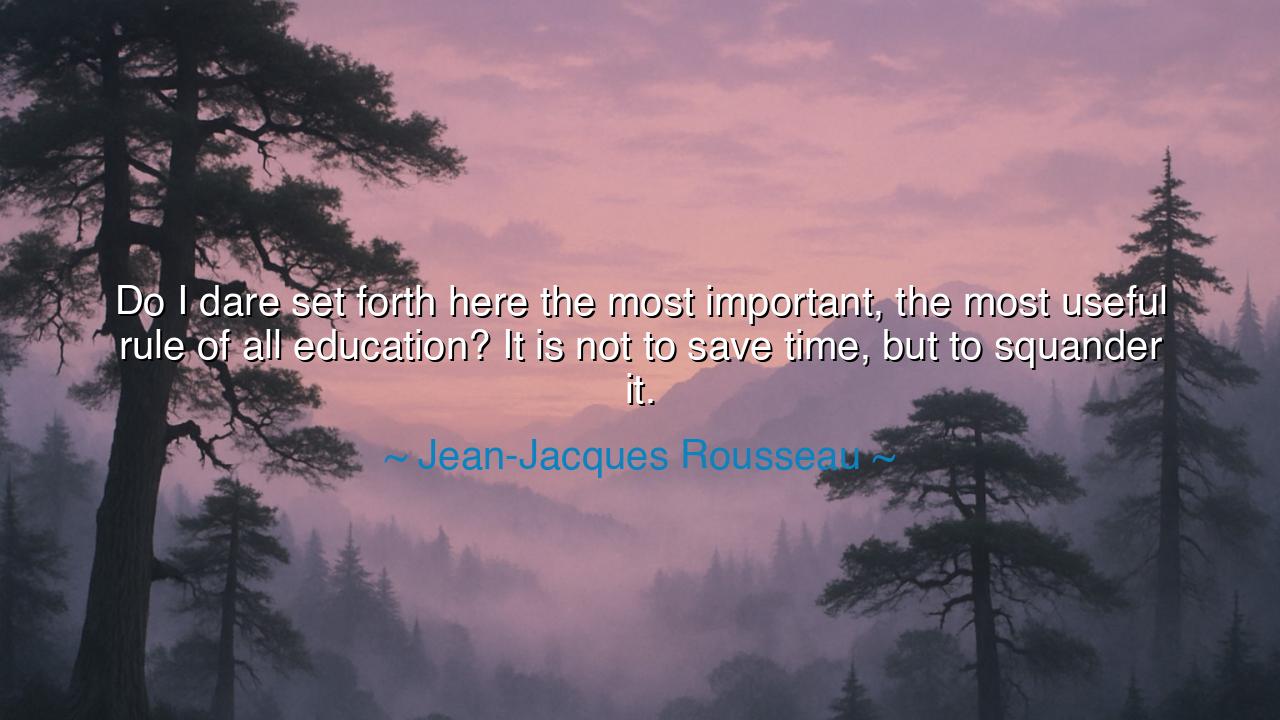
Do I dare set forth here the most important, the most useful rule
Do I dare set forth here the most important, the most useful rule of all education? It is not to save time, but to squander it.






Hear, O lovers of wisdom, the daring words of Jean-Jacques Rousseau, who asked: “Do I dare set forth here the most important, the most useful rule of all education? It is not to save time, but to squander it.” In this bold utterance he shatters the common measure of learning. He warns us that the essence of education is not speed, not efficiency, not the race to outcomes, but the patient art of allowing the mind to wander, explore, and absorb. For in the apparent “waste” of time, true growth takes root.
The meaning of Rousseau’s words lies in his vision of natural development. He saw that children, and indeed all learners, cannot be hurried without losing something precious. To save time in education is to force the mind down narrow paths, to cut away curiosity, to rush toward results. But to squander time, to let the learner dwell in play, reflection, and discovery—this is to allow wisdom to grow at its own pace. It is not waste, but nourishment. Rousseau calls it daring because it stands against the obsession of society with speed and utility.
Consider the life of Leonardo da Vinci, who spent countless hours sketching the curls of water, the wings of birds, and the subtle play of light upon a wall. To his patrons, this seemed a squandering of time, a delay in producing the works they desired. Yet it was precisely this “wastefulness” that gave him the breadth of vision to paint the Mona Lisa and to imagine machines centuries ahead of his day. His education was not efficient, but extravagant in its slowness, and from that extravagance arose genius.
So too in the story of Albert Einstein, who as a boy was thought slow, who daydreamed and let his mind wander in what teachers considered idleness. But it was in those hours of wandering thought that he conceived the questions that would later overturn physics: What would it be like to ride on a beam of light? His so-called squandering of time was in truth the seedbed of discovery. Without it, the world might never have heard of relativity.
The origin of Rousseau’s insight is found in his great work Émile, where he set forth his philosophy of education. He believed that children must be allowed to grow freely, to encounter nature, to experience life, rather than being pressed into premature conformity. To “squander time” was not to indulge laziness, but to respect the natural rhythm of learning. For he saw that forced education makes slaves of the mind, but free exploration makes citizens of the world.
The wisdom here is luminous: the greatest things in life do not come quickly. A tree does not rush to bear fruit, nor does a river hurry to reach the sea. To squander time in education is to imitate nature’s patience, to allow the soul to grow strong roots before bearing the weight of knowledge. It is a call to resist the tyranny of clocks and to embrace the eternal rhythm of human development.
The lesson, O listener, is simple yet profound: do not despise time spent in reflection, in play, in wonder. Do not measure your learning only by what is accomplished today or tomorrow. Allow yourself to “waste” time in the pursuit of curiosity, for in that wandering lies the path to wisdom. Parents, teachers, and leaders—let those you guide breathe, explore, and discover. For it is in the apparent inefficiency of education that its deepest fruits ripen.
Thus remember Rousseau’s daring rule: “It is not to save time, but to squander it.” Do not fear the hours that seem unproductive, for they may be the very hours that shape your destiny. Let time be spent lavishly upon growth, upon wonder, upon discovery. For what the world calls waste, wisdom calls education.






AAdministratorAdministrator
Welcome, honored guests. Please leave a comment, we will respond soon